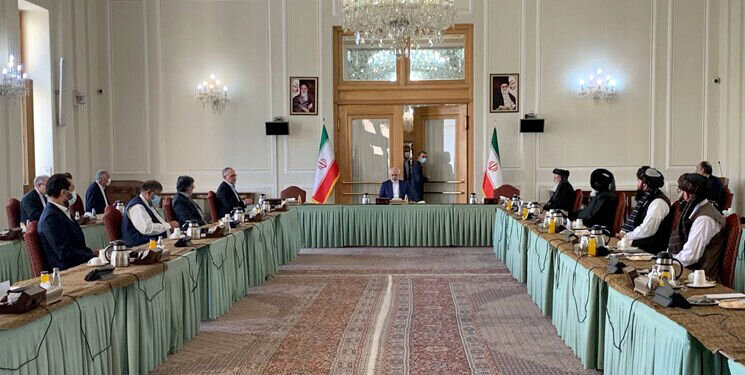Iran elaborates on its Afghanistan policy

TEHRAN – More than a week after the fall of Kabul to the Taliban and the collapse of the Afghan government, Iran outlined its nascent policy toward the new reality in a neighboring country with which Tehran is likely to have difficulty dealing.
In his weekly press briefing on Monday, Iranian Foreign Ministry spokesman Saeed Khatibzadeh spent much of his time speaking about developments in Afghanistan. He took some difficult questions on the future of Iran’s dealings with the Taliban’s Afghanistan.
“The Islamic Republic of Iran is closely following the latest developments in Afghanistan,” Khatibzadeh said.
He was keen to underline the need for dialogue and peaceful resolution of conflicts. “It [Iran] is in constant contact and dialogue with all parties and groups in Afghanistan,” the spokesman added.
Khatibzadeh did not name any of these parties or groups. And this was a usual diplomatic practice. In times of mayhem, one should always be careful not to take sides until the dust settles.
The Taliban is no friend of Iran; it is widely seen as a culprit in shedding the blood of Iranian diplomats in Mazar-i-Sharif, though Iranian officialdom has yet to blame it for the massacre. This may explain why Iranian public opinion holds a gloomy view of the militant group. In fact, many social media users in Iran have largely sympathized with Ahmad Massoud of the Panjshir Valley which became the last beacon of hope for large swaths of the Afghan population to establish a political order with democratic trappings.
During his Monday presser, Khatibzadeh had to answer a question on Massoud. Despite knowing the public mood, the spokesman sought to keep a safe distance from Massoud and the Taliban alike.
When asked whether Iran was in contact with Massoud, Khatibzadeh said Iran is in contact with all parties and groups of Afghanistan. This answer is part of a broader strategy to establish relations with all stakeholders in Afghanistan with the aim of encouraging them to form an all-inclusive government that would ensure and protect the rights of all of Afghanistan’s ethnoreligious groups.
Khatibzadeh made it clear that Iran wants to see the formation of an all-inclusive government in Kabul, one that excludes no one and put an end to the internecine war.
Responding to a question on whether Iran would recognize the Taliban’s rule, he said, “We are basically not at that stage right now. We are now at a stage where we must strive to form an all-inclusive government in Afghanistan that reflects all the realities of Afghanistan and the ethnic and popular composition of Afghanistan from different perspectives.”
Khatibzadeh implied that the formation of such a government would pave the way for Iran to more positively deal with the Taliban. “If the future all-inclusive government of Afghanistan reflects these issues, it can facilitate this path. It is too early for us to decide now on the future government of Afghanistan. Our priority now is to preserve the lives, property, and honor of the Afghan people and to engage in comprehensive dialogue between the various Afghan groups and the formation of an all-inclusive government in this country.”
To this end, Iran will host Pakistan’s Foreign Minister Shah Mahmoud Qureshi on Thursday. Khatibzadeh said this visit will focus on developments in bilateral relations and Afghanistan.
Like Iran, Pakistan has also expressed interest in the formation of an all-inclusive government in Kabul in the wake of the Taliban takeover. “We believe an inclusive political settlement is best way forward,” Qureshi said of Afghanistan on Twitter.
Iran and Pakistan have a shared interest in bringing peace to Afghanistan. Both are neighbors of Afghanistan and any insecurity there would have a direct impact on them. Iran and Pakistan both host a great number of Afghan refugees and they can’t endure another refugee surge.
Preventing another wave of refugees along with other objectives such as preventing extremism and ensuring the rights of Afghan ethnoreligious rights in the new order is the underlying reason for Iran to urge dialogue and tolerance in Kabul.
“We welcome the peaceful transition of power in Afghanistan to an all-inclusive government and hope that the Coordination Council formed in this country will be able to move towards peace in this neighboring country,” Khatibzadeh said.
Leave a Comment